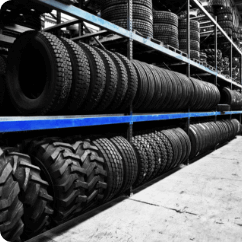Similarly to many universal things, all-season tires have the benefits of being quite versatile, but they also have their limitations. So let’s find the types of tires that better fit your truck or car depending on weather conditions and your expectations.
The all-season tires have been around since the seventies, yet they can still be confused and mixed up with the all-weather tires. The concepts seem rather close, so let’s get this straight first.
All-season tires, for instance, are meant for driving in warm climates with very mild winters. They work best in temperatures above 7 degrees Celsius or 45 degrees Fahrenheit in the cold season. This makes them a good option for southern states like Florida or California. However, they do not fare so well once the surface heat reaches 90 degrees Celsius or 195 degrees Fahrenheit. So when you are scrolling through videos of people frying eggs on the concrete, consider other means of transport that day. And don’t leave your car in the streets at noon’s peak temperature.
All-weather tires, on the other hand, are designed for harsher conditions. They work better in winter, maintaining decent performance in the rain and snow alike. Snow is not something your average all-season tires are meant to deal with. Despite their promising name, they can only be useful when the snow is very thin and the road beneath it is not frozen.
All-season tires vs all-weather tires in the rain
Rain is not exclusive to the winter season, so all-season tires are built to deal with excess water. As long as your tread depth is deeper than 2/32 inches, these tires can effectively squeeze the water out, provide enough traction, and prevent hydroplaning.
However, as the name suggests, all-weather tires will do it better. Their tread is usually deeper and the patterns are meant to weather heavy rainfalls, slush and snow alike. They can be more efficient in colder weather because the rubber can stay flexible in lower temperatures. This makes them safer for driving in the rain when the temperatures are nearing the freezing point.
Can you drive all-season tires year-round?
Of course, the main question is whether you can skip switching tires for winter and summer by using all-season tires. The US does not make it mandatory to use winter tires. But the government doesn’t need to, since the people who occupy the northern and central regions know better anyway. But if you rarely even see the snow in winter and the winters are mild in your part of the state, all-season tires may be a decent option.
Pull up some weather forecasts and check if the temperatures go below what is recommended for all-season tires more than a dozen times throughout the winter. Remember that cold will influence handling, acceleration and braking distance. And it will also shorten the tires’ lifespan. The rubber becomes stiffer and more fragile in the cold, prompting fast deterioration.
All-season tires pros and cons
The greatest appeal of all-season tires is in their versatility. They can be good for summer, autumn, spring and mild winter, making them a unique choice for saving money on equipment. Aside from that, they also have an edge when it comes to tread wear. Unlike all-weather or winter tires, these tires’ softer material is not meant to withstand harsh conditions, so it takes longer for all-season tires to wear off. Just don’t forget to swap them for more even wear.
The same properties guarantee enjoyable driving. The tires offer decent handling and traction without compromising your comfort. Harsher all-weather and winter tires often make extra noise and feel very stiff.
What they lack is true versatility in cold. All-season tires become hard to deal with whenever the temperature drops low enough to form ice and snow. These tires will not be the best option for going off-road or occasionally driving in tough conditions. Driving in heavy snow or through the mud will be more challenging than it could be with all-weather or off-road tires.